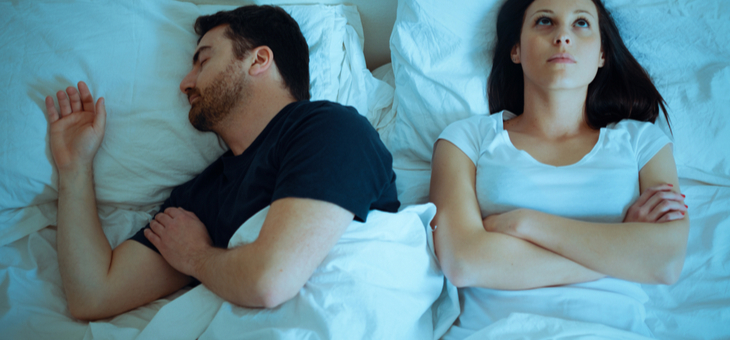Bev is concerned about her partner’s sleep habits, so we consulted sleep apnoea guru Mark Johnson for help explaining the condition in detail.
•••
More than 250,000 Australians have sleep apnoea.
Chances are that number is much higher, as so many cases go undiagnosed.
Many Australians may have common symptoms of sleep apnoea and just write them off as ‘poor sleep’.
Sleep apnoea is more common than you may think and life threatening if not treated.
Obstructive sleep apnoea diagnosis (OSA) is the most common form of sleep apnoea. It’s basically an obstruction of the throat (pharynx or upper airway) caused when the throat muscles relax during sleep.
The muscles in the back of your throat play an important role in keeping your airways open. When these muscles relax, the airways narrow or close as you breathe in.
Partial or complete obstruction can last from 10 seconds to up to a minute or more. When this happens, breathing stops and oxygen level drops. Your brain senses that you are not getting enough oxygen and will rouse you from your sleep. This arousal period is brief (about three seconds) and sometimes you are not even aware of it. But it is enough for you to start breathing again.
In some patients, obstruction of the throat can occur several hundred times a night. The patient does not get a good night’s sleep and the resulting fatigue and tiredness can be disruptive to mental and physical wellbeing.
Loud snoring can be a symptom of sleep apnoea, although not everyone with sleep apnoea snores.
Other common symptoms of sleep apnoea include:
- loud snoring
- gasping, snorting or choking during sleep
- incidents when you have stopped breathing while sleeping (as reported by another person)
- dry mouth
- fatigue and tiredness
- irritability
- morning drowsiness or headaches
- difficulty paying attention or focusing
- insomnia
- hypersomnia (oversleeping in the daytime).
Sleep apnoea can be a potentially dangerous condition. Left untreated, it can lead to more serious complications like chronic fatigue, heart attacks, high blood pressure, type 2 diabetes, metabolic syndrome and complications with medication and surgery.
Sleep apnoea can affect anyone, but there are some factors that increase your risk and some are decisions you can make about your lifestyle.
Sleep apnoea can affect people of any age, but there are certain factors that increase your risk for this condition – or mean you may likely already have it.
Obesity greatly increases the risk of developing obstructive sleep apnoea, with some research suggesting that as many as 40 per cent of people who are excessively overweight suffer from this condition. Fat deposits around the upper airway, such as the neck, tongue and palate, make it tighter and smaller. When you’re asleep and lying down, your airway constricts even more.
Men are two to three times more likely to develop sleep apnoea than premenopausal women. (After menopause, women have about an equal risk.) Obstructive sleep apnoea becomes more frequent as men age. It usually begins in young adulthood and then tapers off in one’s 60s and 70s.
Sedative substances, including alcohol, have a tendency to increase relaxation of the muscles in your mouth and throat. Moreover, medications such as opioid pain relievers and benzodiazepines suppress communication between the brain and body to regulate breathing.
People who smoke are three times more likely to have OSA than non-smokers. Smoking leads to inflammation and fluid retention in the upper airway, which can not only affect breathing but also interfere with the brain’s ability to communicate with the muscles that control breathing.
Whether caused by illness, allergies or an anatomical problem such as a deviated septum, chronic nasal congestion means you’re more likely to develop obstructive sleep apnoea. These conditions can narrow and inflame the airways, causing breathing problems and poor sleep.
There are many ways to combat the condition after receiving a sleep apnoea diagnosis. By far the most popular is a CPAP machine. However, it is important that you choose the correct mask and CPAP machine options when purchasing. Services, such as CPAP Sales have a wide range of brands and styles, and can help you get the best possible CPAP therapy. Don’t buy a machine or a mask until you are happy with your advice and you think you’ve found the best possible price.
Do you have sleep apnoea? Do you think your partner might have it? Now knowing the symptoms, is there a chance you may have it? Would you like to learn more about sleep testing?
If you enjoy our content, don’t keep it to yourself. Share our free eNews with your friends and encourage them to sign up.
Related articles:
https://www.yourlifechoices.com.au/health/brain-health/sleep-apnoea-identical-to-alzheimers
https://www.yourlifechoices.com.au/health/wellbeing/the-dangers-of-sleep-apnoea
https://www.yourlifechoices.com.au/health/your-health/is-it-tiredness-or-sleep-apnoea

